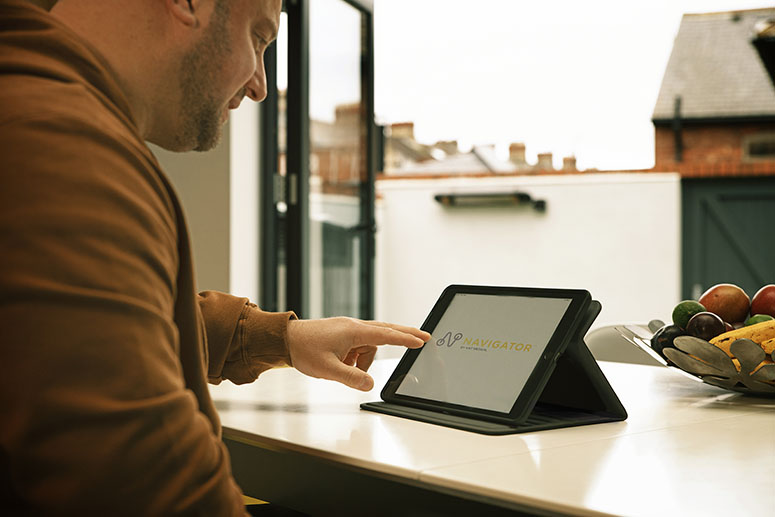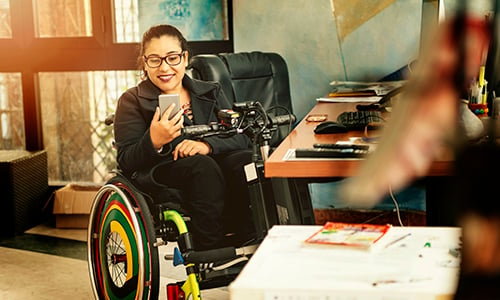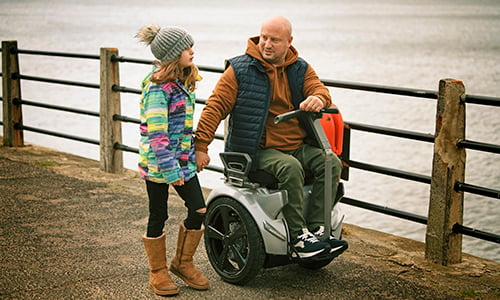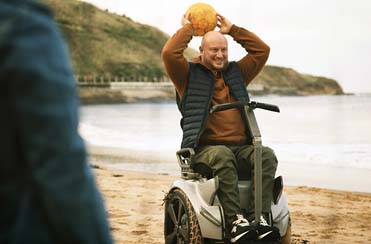Working after suffering a spinal cord injury can be a great way to maintain self-esteem, achieve goals and stay active. To give yourself the best chance at employment, it helps to familiarise yourself with laws and programmes designed to assist those with disabilities like yours.
For survivors of a spinal cord injury, the ability to return to work is important in many respects. Not only does it provide income and other benefits, but it also fosters self-esteem and offers a sense of belonging and overall life satisfaction. The challenge, however, is that most people with an SCI need some form of support, training or vocational rehabilitation to secure employment opportunities.

Here, we outline a few things that people with an SCI should know as they pursue work after spinal cord injury.
The first thing to remember is that the law is on your side. Your rights are protected by both the Equality Act 2010 – which states that employers must allow you to work and make reasonable adjustments for you to do so if you are classed as fit to work – and the UN Convention on the Rights of Persons with Disabilities (CRPD), adopted in 2006.
A few things to know about the Equality Act 2010:
· You are classed as disabled under the Equality Act 2010 if you have a physical or mental impairment that has a substantial and long-term negative effect on your ability to do normal daily activities.
· Employers must make reasonable adjustments to accommodate your disability, provided that this does not mean changing the basic nature of the job.
· When you apply for a job, an employer may only ask questions related to your health or disability to establish whether you are able to carry out a function intrinsic to the work concerned.
· An employer can only ask prospective employees to complete a medical questionnaire once a job offer has been made. The employer must also ensure they have the legal basis to do so under the UK General Data Protection Regulation (UK GDPR). This is usually based on whether this personal data is required to ensure compliance with health and safety obligations.
· If you feel an employer has discriminated against you, you may file a claim against them and may be able to get legal aid to pay for your court action. All claims must be filed within six months minus one day of the discrimination taking place. Citizens Advice should be able to advise you further.
The Equality Act 2010 also protects school pupils from discrimination. Schools are required to remove any barriers that disabled children may face as a result of their disability, to allow them, as far as possible, to access and participate in education in the same way as their peers. This includes access to school trips as well as help and support in school – including providing an aid – and access to learning activities and materials. Likewise, Section 91 of the Equality Act 2010 prohibits discrimination in further and higher education settings, including universities.
As is often the case with those who have suffered a spinal cord injury, the job you may have had before the injury might not be one you are able to perform after. Or, at the very least, you may not be able to perform it in the same way. In these instances, participating in a vocational rehabilitation programme can make a real difference.
Through these programmes, a wide range of services are available to help people identify their career interests and skills, acquire the relevant education or training to find and apply for jobs, and secure workplace adjustments. The good news is that support may be available through the NHS and there are many charities, such as Aspire and the Spinal Injuries Association, willing to provide support as well. This is in addition to national organisations such as the Association for Disabled Professionals.
Fortunately, for those with an SCI, vocational rehabilitation can take place any time an individual needs help finding or maintaining employment. If you are not working but ready and willing to work, or if you are working but dissatisfied with your current job, vocational rehabilitation may be right for you.
Whilst no two vocational rehabilitation programmes are exactly the same, each process is fairly similar. You can expect most programmes to comprise the following elements, practices and procedures:
Programme referral – getting started on a vocational programme typically entails a discussion with your rehabilitation medical professional, who can refer you to a vocational programme counsellor. These are people with advanced degrees, trained to help people with disabilities find employment.
Assessment – successful vocational rehabilitation begins with your counsellor helping you to evaluate your interests, skills, limitations, health needs, work and education histories and even personality, in order to match these interests and needs with characteristics and demands of specific types of jobs. During this assessment phase, you can expect your counsellor to conduct a combination of interviews, questionnaires, medical information requests and sometimes aptitude and skills tests.
Real-life “tests” – performing any job even without a disability is not always a sure thing for either employee or employer. One benefit of many vocational rehabilitation programmes is that they may offer a trial period to ascertain whether you are able to perform the duties the job requires, if you like the job and what, if any, adjustments you may need.
Job market assessment – the job market is constantly evolving. Although you may have been the perfect match for a job in the past, this may not be the case today and you may need to refresh your skills. Your vocational rehabilitation counsellor can help you assess opportunities in your area that best match your skills and interests – not to mention wage requirements and necessary education.
Setting goals: Of course, the end product of the rehabilitation counselling process is deciding on the specific career or occupation that you want to pursue. Whilst this may be your long-term goal, do understand that there may be intermediate steps along the way. These steps – and this journey – should be described in detail as part of a written plan that you and your counsellor create together.
Landing a job: Once all the thorough planning and preparation has been done, it’s time to secure a job. At this point, many people with an SCI secure employment completely on their own. Nevertheless, you should never hesitate to lean on the knowledge and experience of a vocational rehabilitation counsellor, who can help to determine, through job analysis, whether the tasks expected of you and the social and physical expectations of the job match your desires and capabilities.
Once you have secured employment, there are things you should bear in mind as someone with an SCI. Many of these are related to adjustments.
Your disability may require ongoing support and assistance from your workplace, in order to enable you to perform your job effectively. Some of these may include modifying work schedules, tasks or the work environment itself: removing a desk drawer or raising the height of your desk to accommodate a wheelchair; special software and hardware for those who have limited hand function; a private changing area for those with occasional bladder control issues. These are all accommodations that you are well within your rights to request, provided that they do not require your employer to change the intrinsic nature of your job.
Unfortunately, there will be some people with an SCI for whom work is just not possible. It could be someone who lives in a rural area where there are very few employment opportunities. Perhaps you are an older worker unable to transfer your pre-injury skills to a new occupation. The important thing to remember is that there are services and programmes that may be available to assist you.
Speak to your rehabilitation team about vocational rehabilitation programmes that may be available to you, either through the NHS, privately or through one of many charitable organisations.









